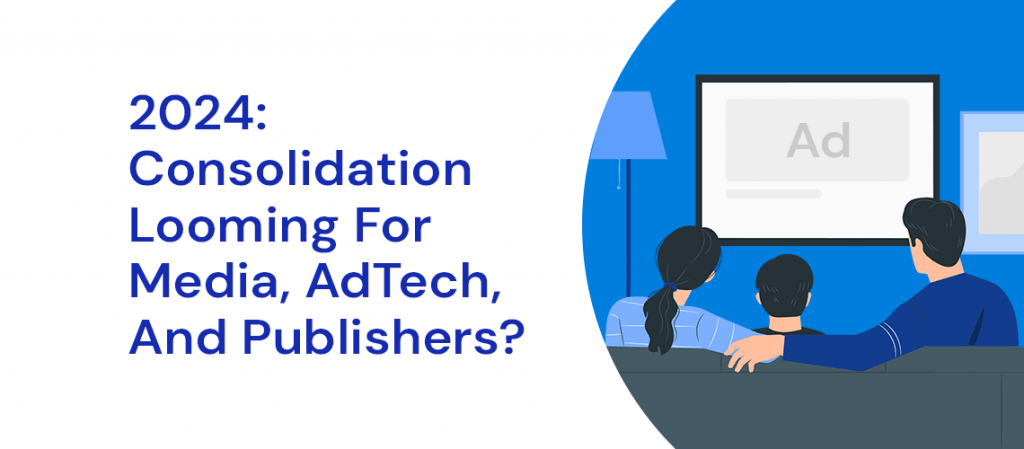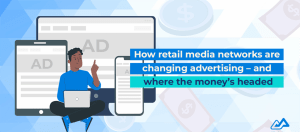At the top end of town, big money M&A appears likely. Warner Bros Discovery and Paramount Global are mulling a deal, though some analysts suggest the latter may instead be sold piecemeal. Ongoing pressure on traditional TV revenues – which will only get worse as Amazon joins Netflix and Disney+ in trying to build scaled ad businesses – also increases the likelihood of Comcast and Disney joining the deal-making fray.
As Lightshed Partners analyst Rich Greenfield told the Financial Times:
“TV advertising is falling far short, cord-cutting is continuing to accelerate, sports costs are going up and the movie business is not performing,” he said.
“Everything is going wrong that can go wrong. The only thing [the companies] know how to do to survive is try to merge and cut costs.”
AdTech and Publishers

After two quiet years, adtech deals could be set to return, particularly if the market is finally forced to accept the reality of third party cookie deprecation. Google is adamant that is the case – and this time appears to really mean it.
There are tonnes of alternative IDs in market – creating major legwork for publishers and the broader ad supply chain. The Trade Desk, leading the line for its open source initiative UID2.0 and sitting on a significant cash pile, is tipped as one of the most likely buying candidates. The Trade Desk "will consider acquiring companies that help reinforce their identity play," Marc Goldberg, CEO of consulting firm Stages Collective, told Business Insider.
Meanwhile, the case for fewer partners in a more privacy-focused marketing environment is commercially strengthened by sustained pressure on ad budgets and increasing recognition that supply chain bloat equals high wastage rates. The ANA’s latest dive into supply chain transparency – which mapped open web programmatic spending for brands including Mondelez, Shell, Nissan, Dell, Molson Coors and Walgreens – makes a compelling argument for consolidation.
If marketers and ad buyers follow those recommendations – specifically the callout that spraying campaigns across tens of thousands of websites is far too broad when ‘75-100 trusted, quality publishers or sellers’ will do the job – smaller independent publishers could end up losers, especially those with poor first party data capability and the know-how to leverage it. With made for advertising (MFA) sites already creaming off double-digit percentages of ad spend on the programmatic open web, the potential for a tsunami of generative AI-created MFA sites only adds to that pressure. The flipside is that those competitive headwinds arguably increase the incentives for publishers to invest in higher quality content, align with partners that can source differentiated demand, better data and higher revenues or, for those with sufficient scale and relationships, go direct. (Equally, some may decide that joining the gen AI-powered MFA gravy train is an easier option).
Data Media Players?
Brian Wieser, former GroupM global business intelligence chief turned principal at advisory Madison and Wall, sees potential for data businesses to push harder into media, potentially in turn fuelling M&A.
Running the numbers of the likes of Kantar (in which WPP is divesting its 40% stake), Ipsos, Experian, TransUnion and Publicis-owned Epsilon, Wieser suggests higher margins – and growth – is on the table.
“Based on what I can see here, this strongly suggests to me that data is probably much more valuable when it’s bundled with something else, like media or services (or possibly software, too). The value of data is improved when someone invests time and effort [to] make it more actionable,” per Wieser.
“Can data asset companies themselves push harder into services or media? I think it might be possible,” he added, provided they can navigate customer concerns, i.e. starting to compete with them.
Wieser’s conclusion? “If we look at sellers of digital advertising, all of whom rely heavily on data, whether first party or third party, when they bundle something with data, they are growing by a rate that’s much faster than the underlying business of data”.
Retail Media

Walmart, with an ad business now topping $3 billion and still in strong double-digit growth mode, is tipped as most likely to acquire over the next 12 months in a bid to compete more closely with Amazon.
"Expect Walmart to be an aggressive industry consolidator, making strategic acquisitions in 2024 to obtain the ad tech capabilities it requires to continue growing its retail media business," Tom Henriksson, general partner at OpenOcean told Business Insider.
Other market watchers told Insider that Amazon itself may be primed to acquire strategic start-ups.
But outside the retail media majors – the large firms capable of dominating local markets – there may be further consolidation in the mid-term. Katie Streeter Hurle, Chief Strategy Officer at commerce consultancy SMG, part of the London-listed Next15 group, thinks M&A – or collaboration and alliances between retailers – could be the only way that the broader retail media market can compete with the big guns in terms of first party data with sufficient scale.
“Is there an opportunity to safely and compliantly bring together multiple sets of retailers’ first-party data for brands and agencies to access through one point? Is this even possible when many of these businesses are competitive and audience duplication could be a challenge?” she wrote earlier this month in The Media Leader.
“This may seem a radical proposition, but in a market where so much investment and power is focused on such a small number of media tech platforms, collaboration between retail media networks (particularly smaller ones) may become inevitable.”
Time will tell whether Streeter Hurle – and others heralding the rise of data collaboration platforms – are on the money. But the alternative is another set of walled gardens where scale usually wins out, and further fragmentation amongst the also-rans.
Hence the consolidation drums beating louder as 2024 goes through the gears and Google’s deadline looms large.


 02/28/2023
02/28/2023
